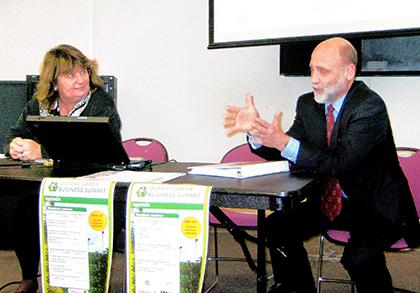By Jeremy Walsh
Eco-friendly technology and policies are making their way into Queens and the rest of the city, but legal conundrums are hot on their heels, experts told entrepreneurs at the second annual Queens Green Business Summit last week.
Speaking to a small group at Queens College Friday, attorney Charlotte Biblow of the law firm Farrel Fritz warned that the state Department of Environmental Conservation’s brownfield clean-up program, which offers tax incentives to developers who remediate polluted sites, has been slow inducting properties into the program.
Partly in response to this, the mayor’s office is creating a local brownfield cleanup organization which is gearing up to allot $30 million in grants to property remediators over the next three years.
Mark McIntyre, an attorney for the mayor’s Office of Environmental Remediation, said the city hopes to streamline the application process compared with the state’s process.
Another major reason for creating the new agency is the state’s refusal to grant any brownfield clean-up incentives for property with “historic fill,” a term used to describe the construction waste and coal ash comprising the ground beneath many of the buildings in the city.
They also hope to create a vacant property database to help developers better understand what is available.
City Councilman James Gennaro (D-Fresh Meadows) is also pushing to hasten the implementation of green technology, sponsoring a Council bill that would create an interagency board to review and approve them for developers in one swoop.
Catherine Barton of the Pinwheel Group hailed Gennaro’s initiative, posing a scenario in which the Forest Hills Tennis Club might want to install a wind turbine on its roof.
“The amount of paperwork and testing is so onerous that the tennis club is discouraged even though they know that in three years they’ll be self-sufficient and have paid back their investment,” she said.
But Manhattan entrepreneur and event founder Stephen Salsburg had a few words of criticism about blindly following the lure of green jobs and technology, claiming there were more than two dozen nonprofit groups being given grants to train people to install photovoltaic solar panels, which have never been popular on the East Coast. “You’re not going to get a job installing PV anytime soon,” he said.
Barton also announced the Doe Fund will soon start collecting restaurant grease from the five boroughs, creating as many as 1,300 jobs in the next year and freeing up space in Dumpsters that saves small businesses money.
Long Island attorney Joseph Harbeson pointed out that the LEED Certification standard for so-called “green buildings” has exploded in popularity over the last five years, but noted its rapid growth has caused numerous headaches when a massive construction project fails to win certification and existing laws fail to identify a single responsible party among a small army of subcontractors.
“All of the complexity is going to lead to a lot of work for lawyers,” he said.
Reach reporter Jeremy Walsh by e-mail at jewalsh@cnglocal.com or by phone at 718-260-4564.



































